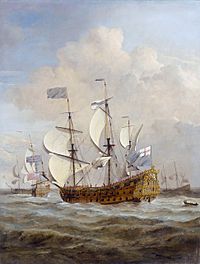HMS St Andrew (1670) facts for kids

'HMS St Andrew at Sea in a Moderate Breeze', oil on canvas, by Willem van de Velde the Younger
|
|
Quick facts for kids History |
|
|---|---|
| Name | HMS St Andrew |
| Builder | Christopher Pett, Woolwich Dockyard |
| Launched | 4 October 1670 |
| Renamed | HMS Royal Anne |
| Fate | Broken up, 1727 |
| General characteristics as built | |
| Class and type | 96-gun first-rate ship of the line |
| Tons burthen | 1298 bm |
| Length | 129 ft (39 m) (keel) |
| Beam | 43 ft 6 in (13.26 m) |
| Depth of hold | 18 ft 8 in (5.69 m) |
| Sail plan | Full-rigged ship |
| Armament | 96 guns of various weights of shot |
| General characteristics after 1703 rebuild | |
| Class and type | 100-gun first-rate ship of the line |
| Tons burthen | 1722 tons |
| Length |
|
| Beam | 48 ft (15 m) |
| Depth of hold | 19 ft 4 in (5.89 m) |
| Sail plan | Full-rigged ship |
| Armament | 100 guns of various weights of shot |
HMS St Andrew was a very powerful warship of its time. It was a 96-gun first-rate ship of the line for the Royal Navy. This means it was one of the biggest and strongest ships. It carried many cannons on its decks.
The ship was built in England at Woolwich Dockyard. This was a famous place for building ships. Construction started under Christopher Pett. After he passed away, Jonas Shish finished the work. The ship was launched in 1670.
Contents
The Mighty HMS St Andrew
HMS St Andrew was an important ship in the Royal Navy. It was designed to fight in naval battles. Its many guns made it a formidable opponent.
Early Battles
In 1692, HMS St Andrew took part in a big battle. It was commanded by George Churchill. The ship helped the English navy win against the French fleet. This victory happened at the Battles of Barfleur and La Hogue.
A New Name and New Adventures
In 1703, the ship got a new name. It was renamed HMS Royal Anne. At the same time, it was rebuilt at Woolwich. The ship was made even bigger and stronger. It now carried 100 guns.
Serving as a Flagship
In 1707, Royal Anne became a flagship. This means it was the main ship for a high-ranking officer. Vice-Admiral of the Blue Sir George Byng used it as his command ship. The Royal Anne was part of Admiral Sir Cloudesley Shovell's large fleet.
The Battle of Toulon
The fleet, including Royal Anne, went to fight in the Battle of Toulon. This battle was not successful for the British. However, Royal Anne continued to serve.
A Dangerous Journey
Later in 1707, the fleet faced a terrible storm. This event is known as the great naval disaster off the Isles of Scilly. Admiral Shovell and four other ships were lost. Nearly 2,000 sailors died in the disaster.
Luckily, Royal Anne survived the storm. It had little to no damage. The ship managed to reach Portsmouth safely.
The End of a Journey
After many years of service, Royal Anne was no longer needed. The ship was "broken up" in 1727. This means it was taken apart. Its materials were likely reused.
 | Victor J. Glover |
 | Yvonne Cagle |
 | Jeanette Epps |
 | Bernard A. Harris Jr. |

